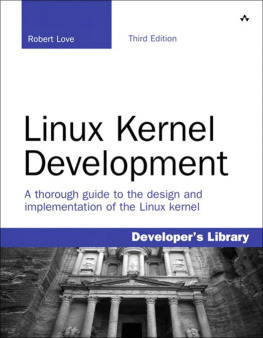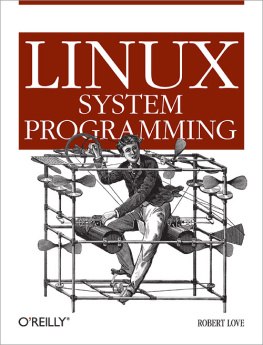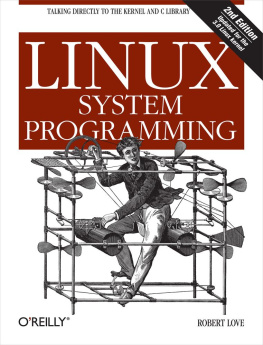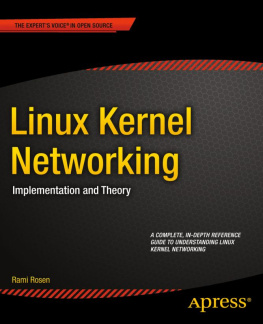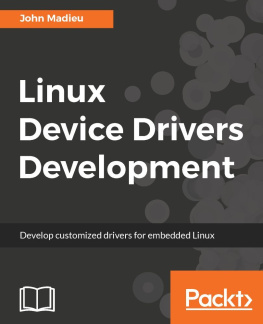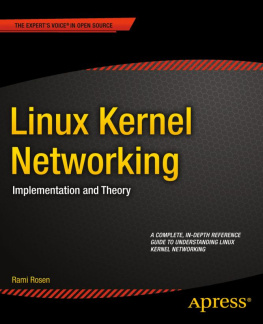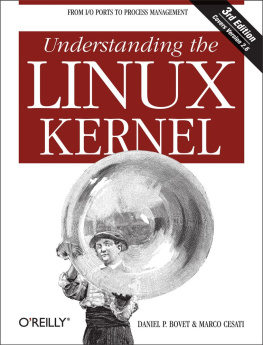Robert Love - Linux Kernel Development
Here you can read online Robert Love - Linux Kernel Development full text of the book (entire story) in english for free. Download pdf and epub, get meaning, cover and reviews about this ebook. year: 2010, publisher: Addison-Wesley, genre: Computer. Description of the work, (preface) as well as reviews are available. Best literature library LitArk.com created for fans of good reading and offers a wide selection of genres:
Romance novel
Science fiction
Adventure
Detective
Science
History
Home and family
Prose
Art
Politics
Computer
Non-fiction
Religion
Business
Children
Humor
Choose a favorite category and find really read worthwhile books. Enjoy immersion in the world of imagination, feel the emotions of the characters or learn something new for yourself, make an fascinating discovery.
- Book:Linux Kernel Development
- Author:
- Publisher:Addison-Wesley
- Genre:
- Year:2010
- Rating:4 / 5
- Favourites:Add to favourites
- Your mark:
- 80
- 1
- 2
- 3
- 4
- 5
Linux Kernel Development: summary, description and annotation
We offer to read an annotation, description, summary or preface (depends on what the author of the book "Linux Kernel Development" wrote himself). If you haven't found the necessary information about the book — write in the comments, we will try to find it.
Linux Kernel Development — read online for free the complete book (whole text) full work
Below is the text of the book, divided by pages. System saving the place of the last page read, allows you to conveniently read the book "Linux Kernel Development" online for free, without having to search again every time where you left off. Put a bookmark, and you can go to the page where you finished reading at any time.
Font size:
Interval:
Bookmark:

ESSENTIAL REFERENCES FOR PROGRAMMING PROFESSIONALS
Developers Library books are designed to provide practicing programmers with unique, high-quality references and tutorials on the programming languages and technologies they use in their daily work.
All books in the Developers Library are written by expert technology practitioners who are especially skilled at organizing and presenting information in a way thats useful for other programmers.
Key titles include some of the best, most widely acclaimed books within their topic areas:
PHP & MySQL Web Development
Luke Welling & Laura Thomson
ISBN 978-0-672-32916-6
MySQL
Paul DuBois
ISBN-13: 978-0-672-32938-8
Linux Kernel Development
Robert Love
ISBN-13: 978-0-672-32946-3
Python Essential Reference
David Beazley
ISBN-13: 978-0-672-32978-6
Programming in Objective-C 2.0
Stephen G. Kochan
ISBN-13: 978-0-321-56615-7
PostgreSQL
Korry Douglas
ISBN-13: 978-0-672-33015-5
Developers Library books are available at most retail and online bookstores, as well as by subscription from Safari Books Online at safari.informit.com
Developers Library
informit.com/devlibrary
Third Edition
Robert Love

Upper Saddle River, NJ Boston Indianapolis San Francisco
New York Toronto Montreal London Munich Paris Madrid
Cape Town Sydney Tokyo Singapore Mexico City
Linux Kernel Development
Third Edition
Copyright 2010 Pearson Education, Inc.
All rights reserved. Printed in the United States of America. This publication is protected by copyright, and permission must be obtained from the publisher prior to any prohibited reproduction, storage in a retrieval system, or transmission in any form or by any means, electronic, mechanical, photocopying, recording, or likewise.
ISBN-13: 978-0-672-32946-3
ISBN-10: 0-672-32946-8
Library of Congress Cataloging-in-Publication Data:
Love, Robert.
Linux kernel development / Robert Love. 3rd ed.
p. cm.
Includes bibliographical references and index.
ISBN 978-0-672-32946-3 (pbk. : alk. paper) 1. Linux. 2. Operating systems (Computers)
I. Title.
QA76.76.O63L674 2010
005.4'32dc22
2010018961
Text printed in the United States on recycled paper at RR Donnelley, Crawfordsville, Indiana.
First printing June 2010
Many of the designations used by manufacturers and sellers to distinguish their products are claimed as trademarks. Where those designations appear in this book, and the publisher was aware of a trademark claim, the designations have been printed with initial capital letters or in all capitals.
The author and publisher have taken care in the preparation of this book, but make no expressed or implied warranty of any kind and assume no responsibility for errors or omissions. No liability is assumed for incidental or consequential damages in connection with or arising out of the use of the information or programs contained herein.
The publisher offers excellent discounts on this book when ordered in quantity for bulk purchases or special sales, which may include electronic versions and/or custom covers and content particular to your business, training goals, marketing focus, and branding interests. For more information, please contact:
U.S. Corporate and Government Sales
(800) 382-3419
For sales outside the United States please contact:
International Sales
Visit us on the Web: informit.com/aw
Acquisitions Editor
Mark Taber
Development Editor
Michael Thurston
Technical Editor
Robert P. J. Day
Managing Editor
Sandra Schroeder
Senior Project Editor
Tonya Simpson
Copy Editor
Apostrophe Editing
Services
Indexer
Brad Herriman
Proofreader
Debbie Williams
Publishing Coordinator
Vanessa Evans
Book Designer
Gary Adair
Compositor
Mark Shirar
For Doris and Helen.
As the Linux kernel and the applications that use it become more widely used, we are seeing an increasing number of system software developers who wish to become involved in the development and maintenance of Linux. Some of these engineers are motivated purely by personal interest, some work for Linux companies, some work for hardware manufacturers, and some are involved with in-house development projects.
But all face a common problem: The learning curve for the kernel is getting longer and steeper. The system is becoming increasingly complex, and it is very large. And as the years pass, the current members of the kernel development team gain deeper and broader knowledge of the kernels internals, which widens the gap between them and newcomers.
I believe that this declining accessibility of the Linux source base is already a problem for the quality of the kernel, and it will become more serious over time. Those who care for Linux clearly have an interest in increasing the number of developers who can contribute to the kernel.
One approach to this problem is to keep the code clean: sensible interfaces, consistent layout, do one thing, do it well, and so on. This is Linus Torvalds solution.
The approach that I counsel is to liberally apply commentary to the code: words that the reader can use to understand what the coder intended to achieve at the time. (The process of identifying divergences between the intent and the implementation is known as debugging. It is hard to do this if the intent is not known.)
But even code commentary does not provide the broad-sweep view of what a major subsystem is intended to do, and of how its developers set about doing it. This, the starting point of understanding, is what the written word serves best.
Robert Loves contribution provides a means by which experienced developers can gain that essential view of what services the kernel subsystems are supposed to provide, and of how they set about providing them. This will be sufficient knowledge for many people: the curious, the application developers, those who wish to evaluate the kernels design, and others.
But the book is also a stepping stone to take aspiring kernel developers to the next stage, which is making alterations to the kernel to achieve some defined objective. I would encourage aspiring developers to get their hands dirty: The best way to understand a part of the kernel is to make changes to it. Making a change forces the developer to a level of understanding which merely reading the code does not provide. The serious kernel developer will join the development mailing lists and will interact with other developers. This interaction is the primary means by which kernel contributors learn and stay abreast. Robert covers the mechanics and culture of this important part of kernel life well.
Please enjoy and learn from Roberts book. And should you decide to take the next step and become a member of the kernel development community, consider yourself welcomed in advance. We value and measure people by the usefulness of their contributions, and when you contribute to Linux, you do so in the knowledge that your work is of small but immediate benefit to tens or even hundreds of millions of human beings. This is a most enjoyable privilege and responsibility.
Next pageFont size:
Interval:
Bookmark:
Similar books «Linux Kernel Development»
Look at similar books to Linux Kernel Development. We have selected literature similar in name and meaning in the hope of providing readers with more options to find new, interesting, not yet read works.
Discussion, reviews of the book Linux Kernel Development and just readers' own opinions. Leave your comments, write what you think about the work, its meaning or the main characters. Specify what exactly you liked and what you didn't like, and why you think so.

